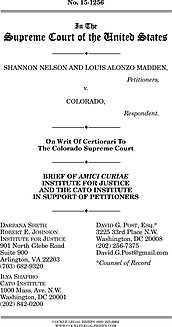Nelson v. Colorado
Learn more about Cato’s Amicus Briefs Program.
Shannon Nelson was convicted of sexual assault in 2006. In addition to prison time, she had to pay over $8,000 in various fees, costs, and restitution payments. Her conviction was overturned on appeal, however, and, on retrial, she was acquitted of all charges. She then sought to get the money she had paid to the state returned to her. Every state imposes various monetary penalties on those convicted of a crime. Colorado, however, appears to be the only state that does not refund those penalties when a conviction is reversed. Instead, defendants are required to essentially prove their “actual innocence” by clear and convincing evidence in a separate civil proceeding. Nelson asked the Colorado Supreme Court to review that requirement, arguing that it violated due process. The Court disagreed, writing that “due process does not require a refund of costs, fees, and restitution when a defendant’s conviction is reversed and she is subsequently acquitted.” Nelson appealed to the United States Supreme Court and the Court agreed to hear her case. The Cato Institute, along with the Institute for Justice, has filed an amicus brief supporting Nelson. We argue that the presumption of innocence is the foundation of the very concept of justice. Benjamin Franklin, our founding grandfather, wrote, “That it is better 100 guilty Persons should escape than that one innocent Person should suffer, is a Maxim that has been long and generally approved.” As early as 1827, the Supreme Court recognized that “the general rule of our jurisprudence is, that the party accused need not establish his innocence, but it is for the government itself to prove his guilt.” The Colorado Supreme Court has flipped this basic principle of due process on its head by requiring the defendant to prove “actual innocence.” Every person is innocent until they are proven guilty and we ask the Supreme Court to reaffirm this basic fact.





